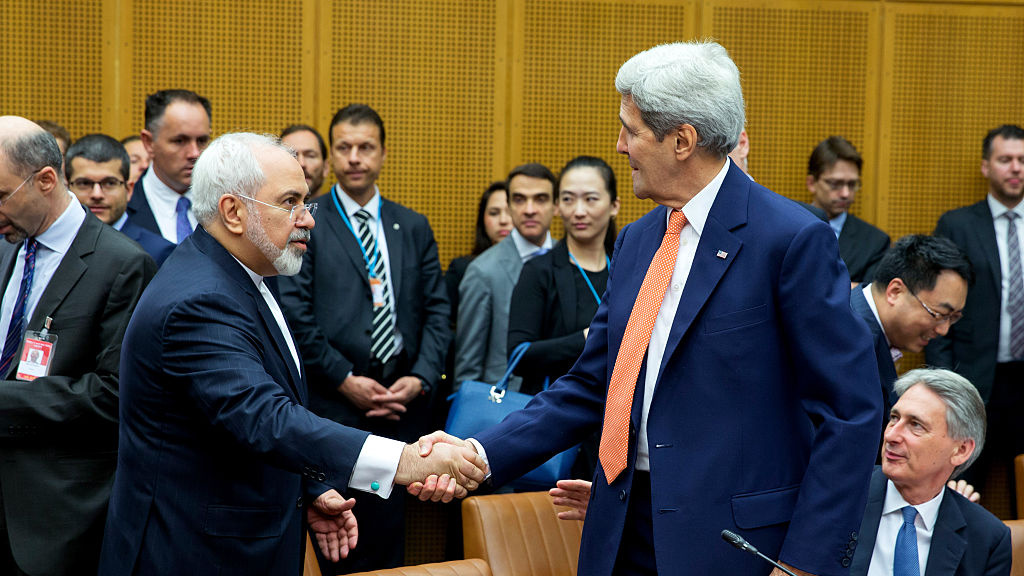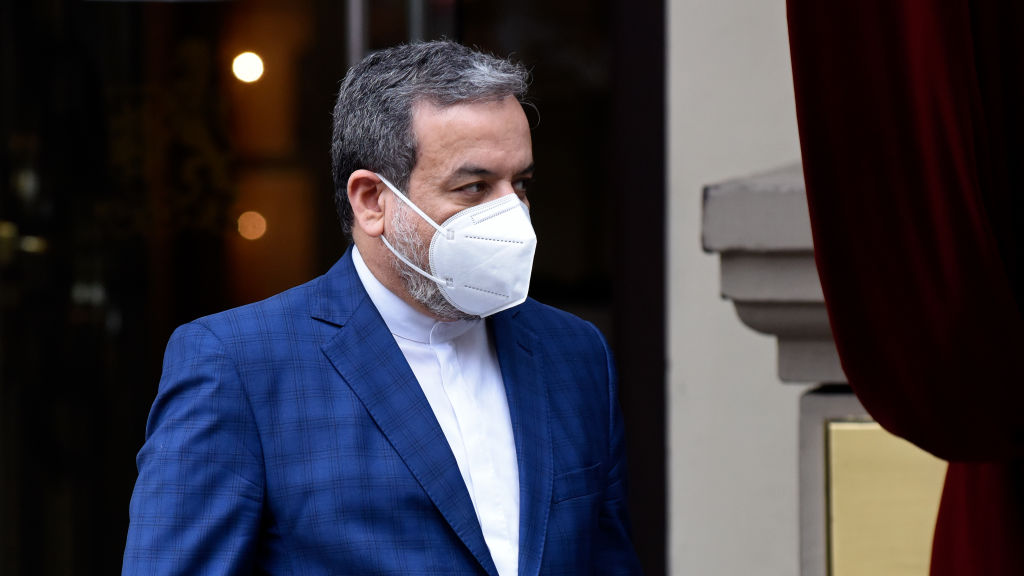
Foreign Minister of Iran, Mohammad Javad Zarif shakes hands with then U.S. Secretary of State John Kerry at the last working session of E 3+3 negotiations in Vienna, Austria, July 14, 2015. /Getty
Foreign Minister of Iran, Mohammad Javad Zarif shakes hands with then U.S. Secretary of State John Kerry at the last working session of E 3+3 negotiations in Vienna, Austria, July 14, 2015. /Getty
Editor's note: Hamzah Rifaat Hussain is a former visiting fellow at the Stimson Center in Washington and serves as assistant researcher at the Islamabad Policy Research Institute (IPRI) in Pakistan. The article reflects the author's opinions and not necessarily the views of CGTN.
With just a month to go before the Ebrahim Raisi administration formally assumes office in Tehran, the Biden administration continues to shelve the policy of waiving sanctions as concomitant talks aimed at resuscitating the JCPOA deal of 2015 take place.
While Washington's approach remains predictably static, there exists a lingering problem as regional developments within a dynamic Middle Eastern landscape unfold. The truth is that the window period for Iranian compliance is shrinking with appeals made by the UN Secretary-General Antonio Guterres to Washington D.C. to lift pernicious sanctions being part of wider concerns of the international community that a travesty for both multilateralism and peace in the region could materialize due to this rigid approach.
This is not simply about supporting negotiations but honoring the spirit of the JCPOA deal by providing concessions to Iran. So far, it's been a disappointment.
With the Raisi administration assuming office shortly, Tehran's previous proclivity towards multilateralism subject to sanction waivers from the United States is difficult to predict. Furthermore, the possibility of outright dismissal of multilateral proposals remains high with a two-pronged approach adopted by the Biden administration based on stated commitments on reviving the JCPOA deal while refraining from sanction waivers breeding skepticism within Iran.
There is a domestic political prism to Iranian defiance alongside foreign policy considerations where sanctions on trade in oil having a direct impact on the national economy, with arms embargoes being inconsistent with relevant UN Security Council resolutions.
Raisi's rise to power is also anchored in expectations that economic woes plaguing the national economy as a direct consequence of American hard-handedness will be addressed through a more pragmatic approach which counters needless teetering of sanction waivers from the United States.
Then comes the question of regional dynamics, which are linked with Washington D.C. abiding by the spirit of the JCPOA. Factors missing from Washington's decision of shelving concessionary approaches in favor of duplicitous ones include Iran's own regional threat perceptions.

Iranian deputy foreign minister Abbas Araghchi leaves the Grand Hotel on the day the JCPOA Iran nuclear talks resumes in Vienna, Austria, May 7, 2021. /Getty
Iranian deputy foreign minister Abbas Araghchi leaves the Grand Hotel on the day the JCPOA Iran nuclear talks resumes in Vienna, Austria, May 7, 2021. /Getty
A change in administration in Israel where the Naftali-Lapid government set to revive the Jared Kushner approach on cementing bilateral relationships with Gulf States at the expense of the Palestinian cause has a direct impact on prospects of peace between all states in the region, including Iran.
While the U.S. has welcomed the new administration in Israel by stressing the importance of enhancing strategic cooperation, it has turned a blind eye with a lackadaisical approach towards Iran regarding the glacial pace of proposed sanction waivers.
This is an unequivocal binary approach risking greater confrontation in the Middle East as the region is underpinned by delicate, credible deterrence despite overt conflicts not taking place.
This lackadaisical approach is also unfathomable, given that opportunities do exist regarding ensuring full Iranian compliance with the contours of the JCPOA deal of 2015. Yet, the question of Iran sustaining its compliance remains unaddressed. So far, Tehran has refined uranium up to a purity level of 60 percent, which according to some nuclear experts, far exceeds the cap of 3.67 percent as enshrined in the deal.
Yet, Tehran also maintains that it only seeks to advance civilian nuclear power and will rescind its refinement sprees subject to Washington returning back to the deal and rescinding sanctions. Despite this, an open question is up for grabs as to how long the new Iranian leadership in August will sit comfortably with the lack of U.S. action, with some pundits expressing cautious optimism.
The risk of stakeholders unilaterally withdrawing from the agreement due to Washington D.C.'s approach looms large, with the Raisi administration's approach proving difficult to predict as either being conciliatory, amenable or outright defiant.
Yet still, there are no sanction waivers, with opportunities being missed to establish goodwill with Tehran instead of attempting to isolate it diplomatically and economically. So far, the U.S. adamancy has demonstrated that the disturbing trend of adopting policies that strangulate the Iranian economy, which was characteristic of the Trump administration during the pandemic, has continued.
Without an understanding that mending a global, unilateral agreement goes beyond mere lip service, Iranian defiance will translate into Middle Eastern peace remaining elusive. The UN Secretary General's insistence is based on a solid foundation.
(If you want to contribute and have specific expertise, please contact us at opinions@cgtn.com.)

